UPPER WEST SIDE
This area did not begin to develop until the 1870s, when the 9th Avenue El went up, making it possible to commute to Midtown. When the Dakota, New York’s first luxury apartment building, was completed in 1884, it was followed by others on Central Park West and Broadway, while side streets were filled with handsome brownstones. The West Side remains a desirable neighborhood with much of the city’s best residential archi-tecture. The creation of the Lincoln Center in the 1950s was a great boost to the area, and the fantastic American Museum of Natural History is also a draw.
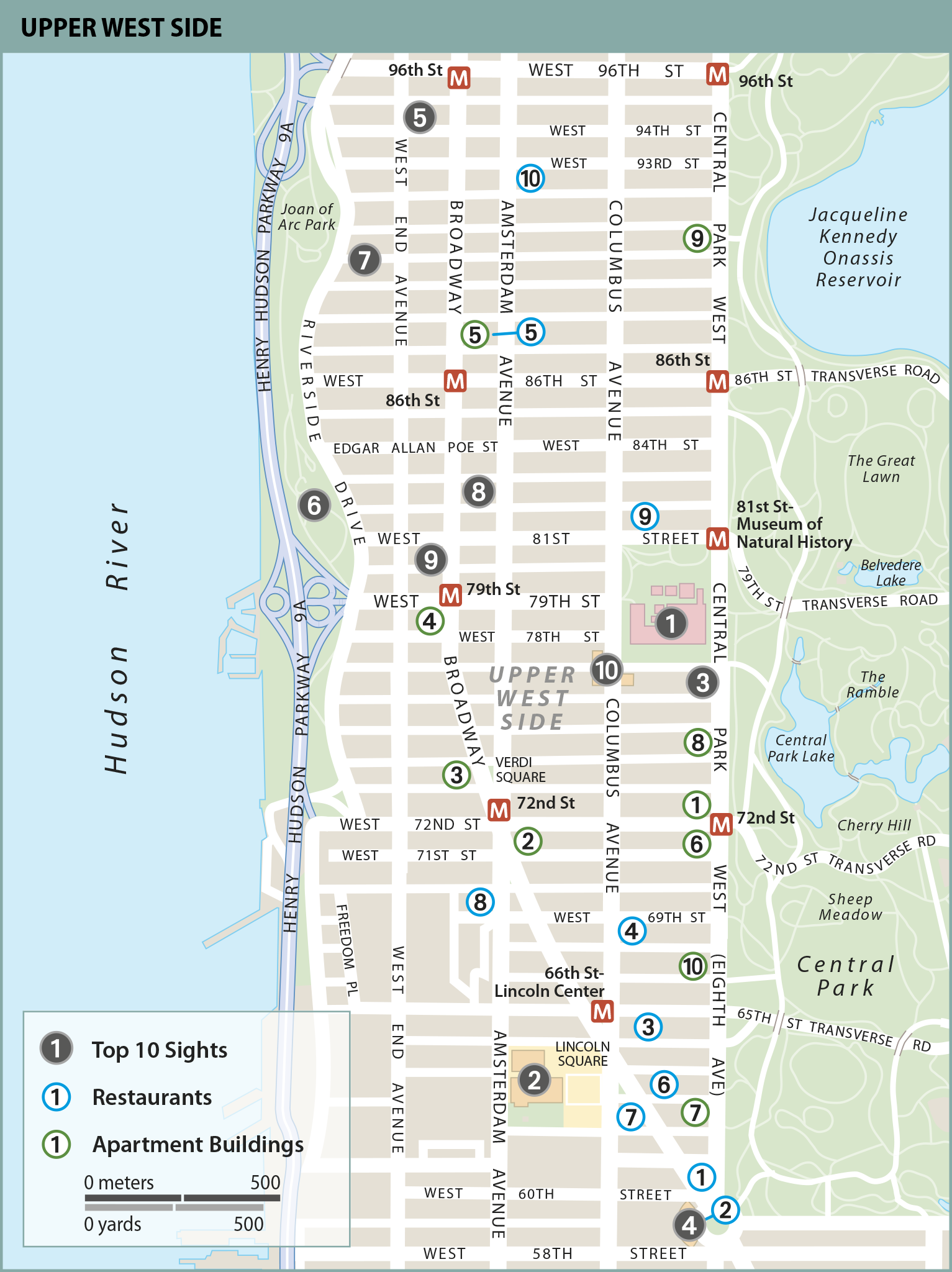
1.American Museum of Natural History
The mammoth museum’s holdings include more than 32 million artifacts and specimens (for further details see American Museum of Natural History).
2.Lincoln Center for the Performing Arts
 Columbus to Amsterdam Aves, between 62nd & 66th Sts • Tours twice daily • Admission charge
Columbus to Amsterdam Aves, between 62nd & 66th Sts • Tours twice daily • Admission charge Built on 15 acres (6 ha) during the 1950s, transforming slums into a giant cultural complex, the Lincoln Center houses an array of venues: the Metropolitan Opera; the New York City Opera and Ballet; the New York Philharmonic; the Lincoln Center and Walter Reade theaters; Avery Fisher and Alice Tully halls; and the Julliard School. In the summer, the popular Mostly Mozart concerts take place, and free concerts are held in the adjacent park. The Jazz at Lincoln Center headquarters is located in the Time Warner building at Columbus Circle.
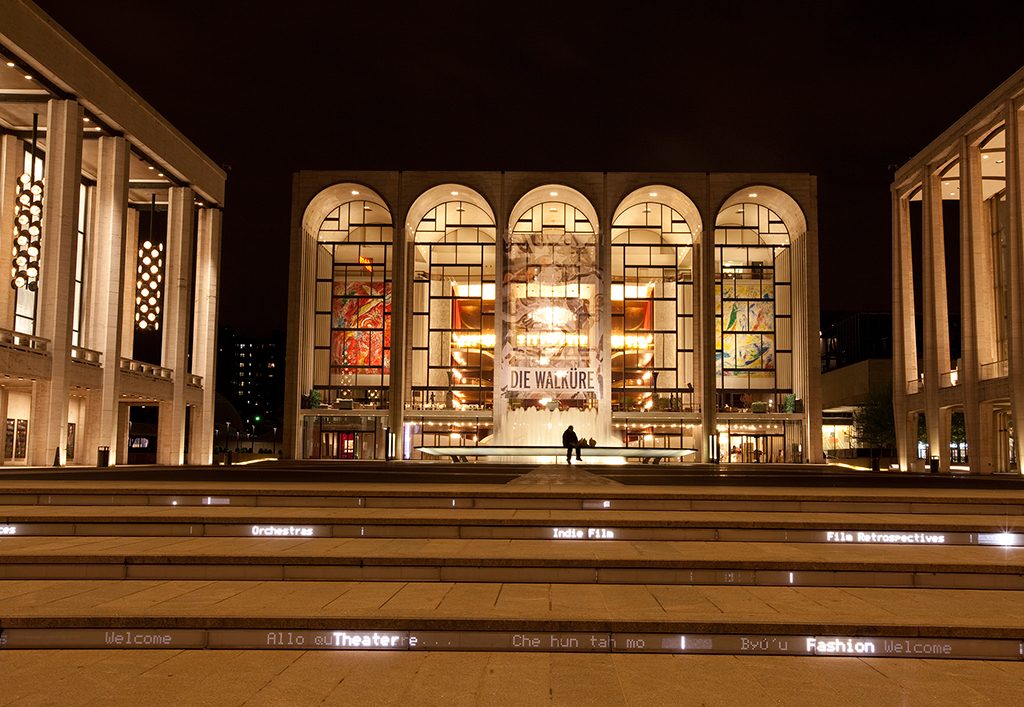
Lincoln Center for the Performing Arts
3.New York Historical Society
 2 West 77th St at Central Park West • Open 10am–6pm Tue–Sat (to 8pm Fri), 11am–5pm Sun • Adm charge • www.nyhistory.org
2 West 77th St at Central Park West • Open 10am–6pm Tue–Sat (to 8pm Fri), 11am–5pm Sun • Adm charge • www.nyhistory.org New York’s oldest museum, founded in 1804, reopened in 2011 after an extensive renovation that saw $70 million invested over three years. The museum features more than 40,000 objects divided into such areas as paintings, sculpture, furniture, silver, tools, and, notably, Tiffany lamps. Other galleries within the museum are used to display changing exhibits. The New York Historical Society also maintains a children’s gallery, as well as a research library.
4.Columbus Circle
 Columbus Circle
Columbus Circle One of the largest building projects in New York’s history has transformed this neglected urban plaza into an important public site. The redevelopment has attracted national and international business, such as giant media company Time Warner, which has its headquarters in an 80-story skyscraper. The building contains shops, entertainment, restaurants, and the Mandarin Oriental hotel. It is also home to Jazz at Lincoln Center, the world’s first performing arts facility dedicated to jazz. Other structures around Columbus Circle include Hearst House, Trump International Hotel, and the Maine Monument.
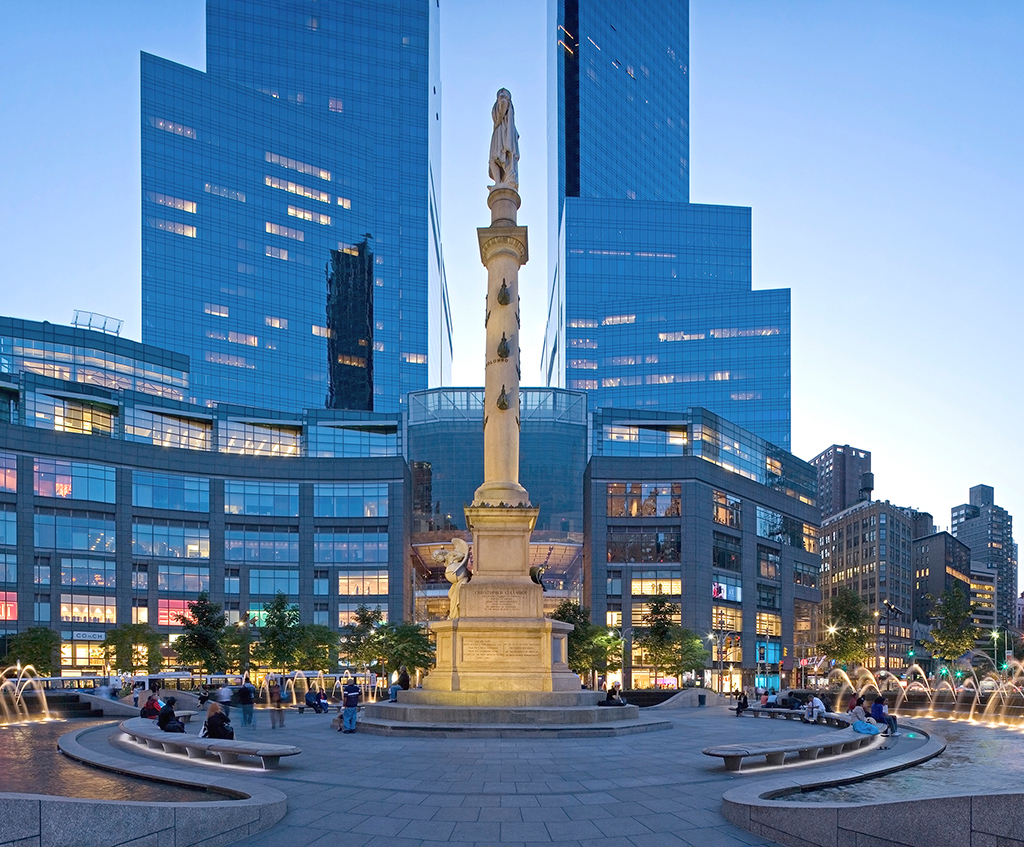
Skyscrapers behind Columbus Circle
5.Pomander Walk
 261–7 West 94th St, between Broadway & West End Ave
261–7 West 94th St, between Broadway & West End Ave This double row of small brick and stucco, timbered, Tudoresque townhouses, hidden on a private street, is one of the many delightful surprises to be discovered in Manhattan. The developer, a restaurateur named Thomas Healy, took his inspiration in 1921 from the sets used for a popular play by Louis Parker called Pomander Walk, hoping to recreate the village atmosphere depicted in the romantic comedy. Gloria Swanson, Rosalind Russell, and Humphrey Bogart are among the actors who have lived here.
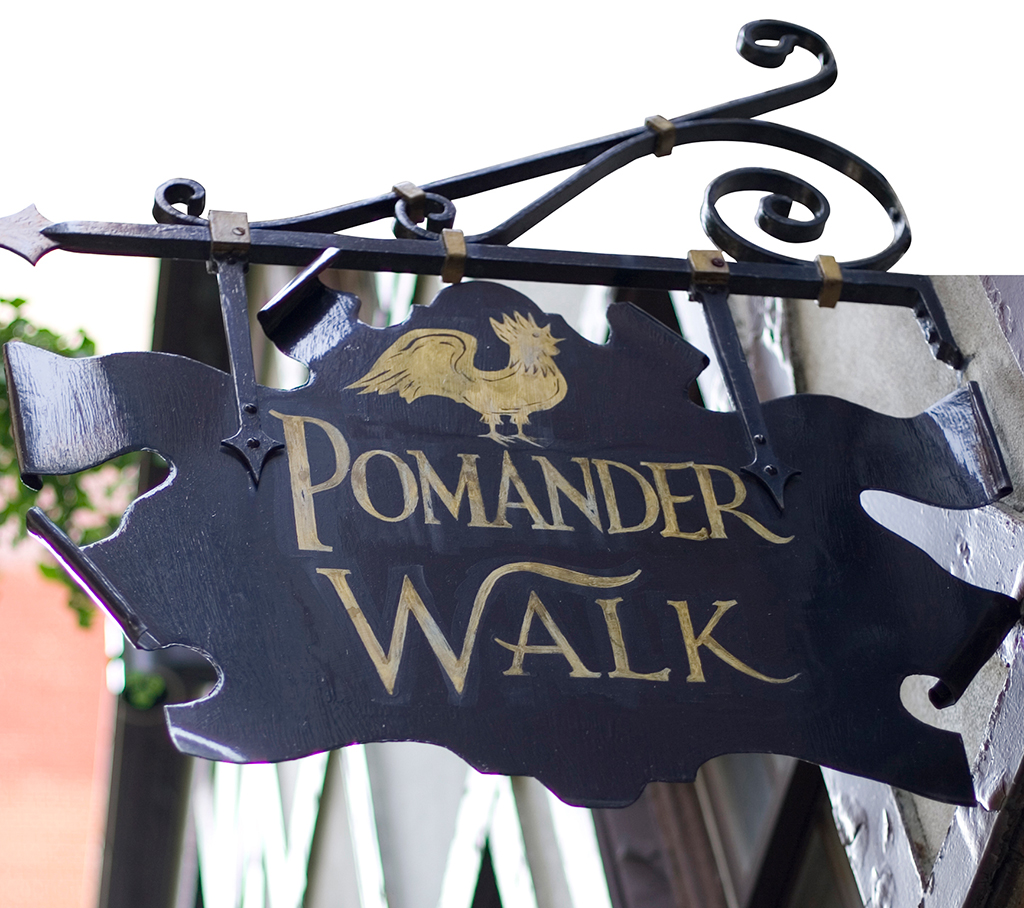
Pomander Walk
6.Riverside Park
 Riverside Drive, 72nd to 155th Sts • Open 6am–1am daily • Free
Riverside Drive, 72nd to 155th Sts • Open 6am–1am daily • Free Another example of the landscape genius of Frederick Law Olmsted, Riverside Park is a woodsy band of green planned in 1873 that follows Riverside Drive for 70 blocks and hiding the abandoned railroad tracks below. Playgrounds, sports fields, a promenade, and monuments were added later. Dating from 1902, the impressive marble Soldiers’ and Sailors’ Monument at 89th Street is a memorial to those who died during the American Civil War.
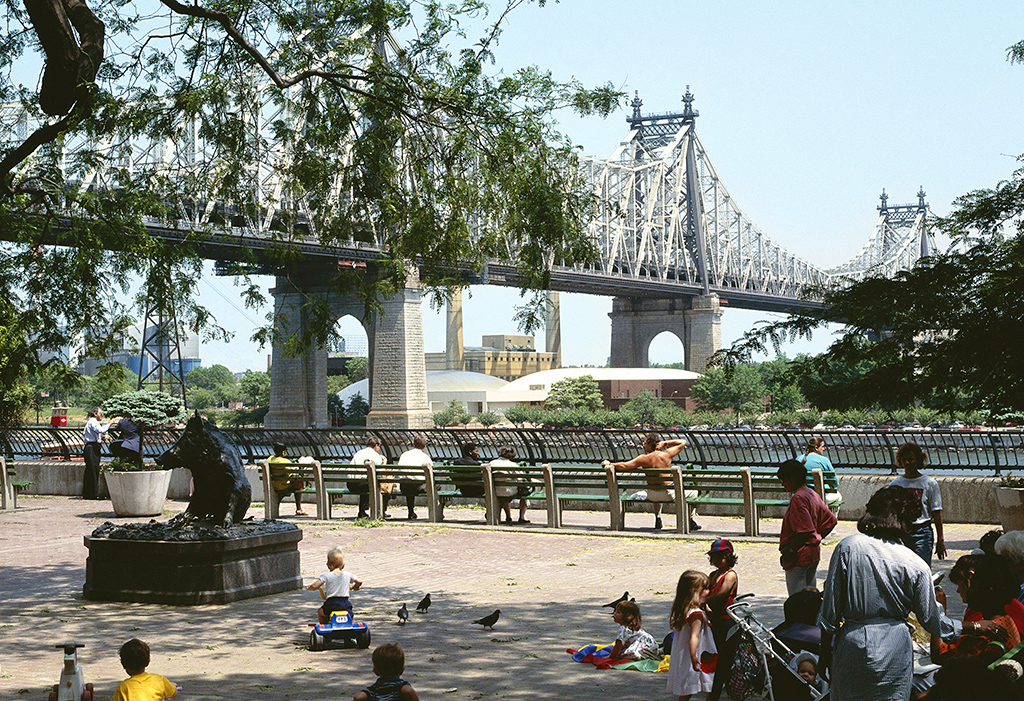
Riverside Park
7.Riverside Drive/West End Historic District
 Between Riverside Drive & West End Ave, 85th & 95th Sts
Between Riverside Drive & West End Ave, 85th & 95th Sts A walk through this historic area showcases the late 19th-century townhouses that characterize the Upper West Side. West 88th Street is a good example. The earliest houses, Nos. 267–71, were built in 1884. Nos. 302–38, dating from the early 1890s, have stepped gables and Roman brick, while Nos. 315–23, built around 1896, have bow fronts in brown or white stone. The Yeshiva Ketana School, at 346 West 89th Street, begun in 1901 by Herts and Tallant, occupies one of the few surviving mansions that once lined Riverside Drive.
8.Children’s Museum of Manhattan
 212 West 83rd St at Broadway • Open 10am–5pm Tue–Sun (to 7pm on Sat) • Admission charge • www.cmom.org
212 West 83rd St at Broadway • Open 10am–5pm Tue–Sun (to 7pm on Sat) • Admission charge • www.cmom.org Founded in 1973, in a former school building, this museum is dedicated to the principle that children learn best through self-discovery. It uses a variety of participatory activities and fantasy world environments to engage its young visitors in learning that is fun. The museum’s range of activities include exhibits to intrigue older children, while Adventures with Dora and Diego provides a distraction for two- to six-year-olds at the same time as educating them about animals and their environments (for further details see Children’s Museum of Manhattan).
9.Zabar’s
 2245 Broadway at 80th St
2245 Broadway at 80th St A monument to New York’s mania for finding the best foods and a landmark since 1934, this always-crowded market sells smoked salmon, sturgeon, and other Jewish delicacies, along with wonderful bread, desserts, coffee, and cheeses, and big selections of oils, vinegars, olives, and gourmet gift baskets. The second floor is filled with cooking equipment, and the adjacent coffee counter at the 80th Street corner offers delicious baked goods, sandwiches, coffees, and smoothies.
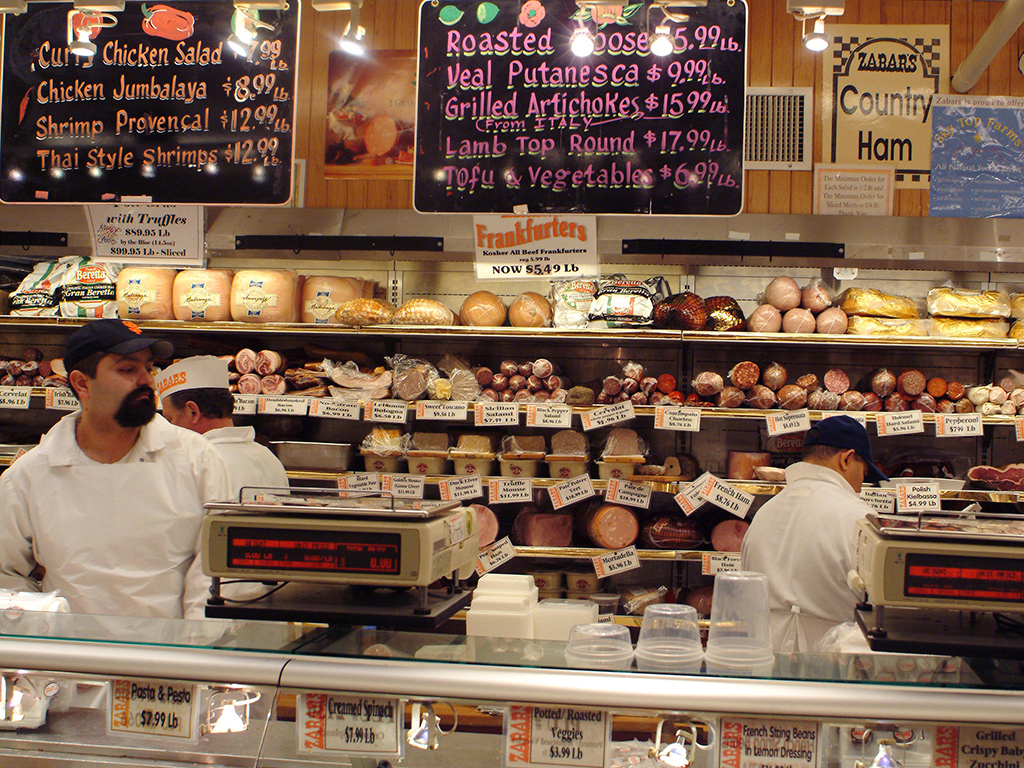
Deli counter at Zabar’s
10.Green Flea Market/ 77th Street Flea Market
 100 West 77th St at Columbus Ave
100 West 77th St at Columbus Ave Flea market junkies throng this school yard every Sunday, hoping for finds among the piles of vintage clothing, books, jewelry, prints, and memorabilia. Less glamorous, new merchandise is also sold here. On a good day as many as 300 booths crowd the premises. A weekly green market shares the same space.
UPPER WEST SIDE ARCHITECTURE
The Upper West Side’s side streets are lined with fine rows of the typical brownstones favored by New York’s 19th-century middle classes. Built of inexpensive, local, brown sandstone, the narrow buildings are usually three or four stories high, and have a flight of steps called a “stoop” that leads from street level to the living floors.
WALK ON THE WEST SIDE
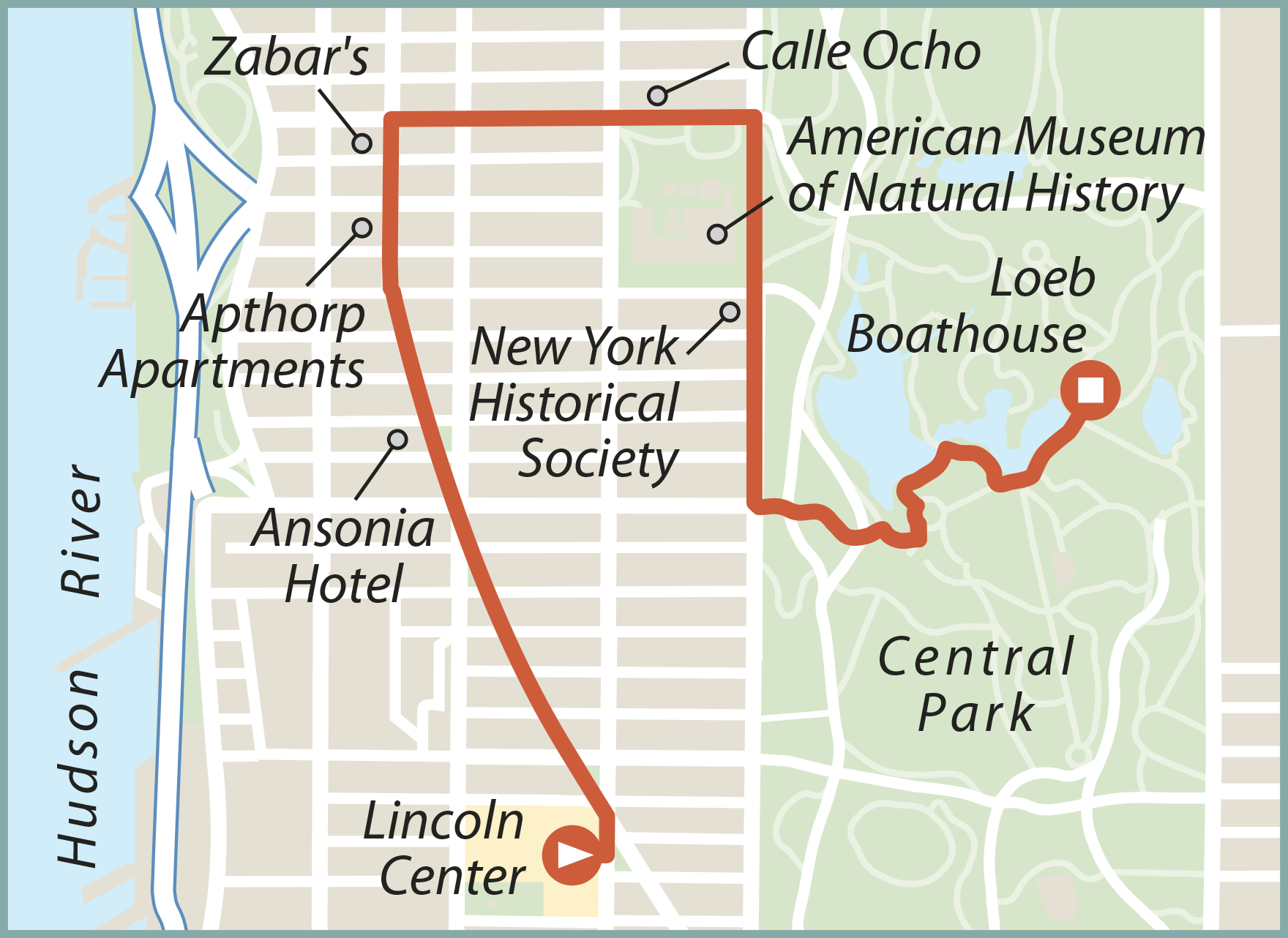
Morning
Begin at Lincoln Center and admire the plaza, the Chagall windows at the Metropolitan Opera, and the Henry Moore statue in front of Lincoln Center Theater. The New York Public Library for the Performing Arts on Amsterdam Avenue, behind the theater, is notable for its enormous collection of books about the performing arts.
Make your way up Broadway, window shopping and noting some of the landmark buildings such as the Apthorp Apartments and the Ansonia Hotel, and the West Side’s gastronomic palaces, such as Fairway at 75th Street and Zabar’s. Almost any side street will reveal examples of the area’s great line-up of brownstone townhouses. Finally, head east to Columbus Avenue and Calle Ocho for a Cuban lunch.
Afternoon
The American Museum of Natural History can easily fill an entire afternoon, and the New York Historical Society has an amazing collection on show.
Stroll down Central Park West and admire the landmark apartment buildings that can be seen here, and then head for Central Park, the city’s vast “backyard”. Take a boat out on the lake, or enjoy a gondola ride around it, followed by drinks at the Loeb Boathouse, the perfect end to an afternoon.
Apartment Buildings
1.Dakota
 1 West 72nd St at Central Park West • Closed to public
1 West 72nd St at Central Park West • Closed to public Famous as the site of John Lennon’s murder, it was thought so far west in 1884, it might as well be in Dakota.
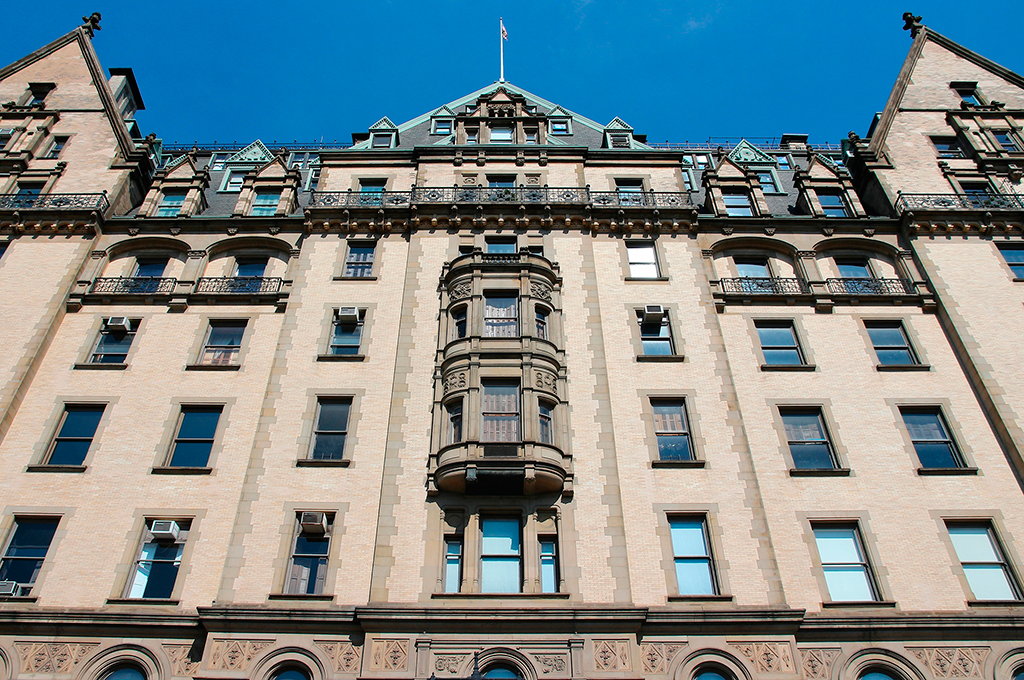
Dakota, John Lennon’s last home
2.Dorilton
 171 West 71st St at Broadway • Closed to public
171 West 71st St at Broadway • Closed to public One of the most flamboyant examples of the Beaux Arts era, this 1902 apartment house has an iron gate fit for a palace.
3.Ansonia
 2109 Broadway, between 73rd & 74th Sts • Closed to public
2109 Broadway, between 73rd & 74th Sts • Closed to public This 1908 apartment-hotel included soundproof partitions, a feature that has attracted many distinguished musicians.
4.Apthorp
 Broadway, between 78th & 79th Sts • Closed to public
Broadway, between 78th & 79th Sts • Closed to public Modeled after an Italian Renaissance palazzo, this 1908 full-block building includes a huge interior courtyard.
5.Belnord
 225 West 86th St, at Amsterdam Ave • Closed to public
225 West 86th St, at Amsterdam Ave • Closed to public Even larger than the Apthorp, and also with its own large interior courtyard, this 1908 Renaissance Revival structure is where Nobel Prize-winning author Isaac Bashevis Singer lived and wrote.
6.Majestic
 115 Central Park West, between 71st & 72nd Sts • Closed to public
115 Central Park West, between 71st & 72nd Sts • Closed to public The first of architect Irwin Chanin’s two 1931 landmarks, and one of the original four twin towers that dominate the West Side skyline.
7.Century
 25 Central Park West, between 62nd & 63rd Sts • Closed to public
25 Central Park West, between 62nd & 63rd Sts • Closed to public Irwin Chanin’s second twin tower, consisting of 30 stories, is the tallest on the block, and an Art Deco icon.
8.San Remo
 145–6 Central Park West, between 74th & 75th Sts • Closed to public
145–6 Central Park West, between 74th & 75th Sts • Closed to public Architect Emery Roth’s 1930 Art Deco masterpiece is an extremely sophisticated adaptation of Renaissance forms. The twin towers hide water tanks.
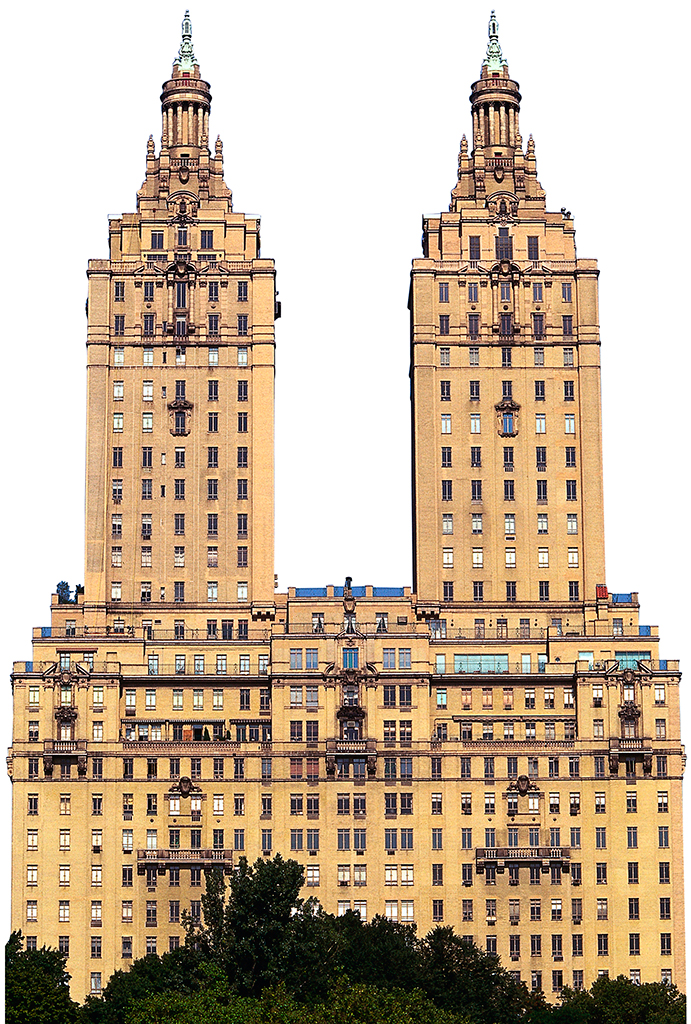
San Remo’s twin towers
9.Eldorado
 300 Central Park West, between 90th & 91st Sts • Closed to public
300 Central Park West, between 90th & 91st Sts • Closed to public Another Art Deco design by Emery Roth. Past celebrity tenants have included Groucho Marx and Marilyn Monroe.
10.Hotel des Artistes
 West 67th St, between Central Park West & Columbus Ave • Closed to public
West 67th St, between Central Park West & Columbus Ave • Closed to public Built in 1918 as artists’ studios and apartments, with double-height windows, the spaces are much coveted. Residents have included Noël Coward and Isadora Duncan.
Restaurants
1.Jean-Georges
 1 Central Park West, Trump International Hotel • 212 285 0222 • $$$
1 Central Park West, Trump International Hotel • 212 285 0222 • $$$ Jean-Georges Vongerichten’s namesake restaurant is among the finest in New York.
2.Per Se
 Time Warner Center, Columbus Circle • 212 285 0222 • $$$
Time Warner Center, Columbus Circle • 212 285 0222 • $$$ Book well in advance for this critically acclaimed restaurant owned by well-known restaurateur Thomas Keller (for further details see Per Se).
3.Shun Lee Café
 43 West 65th St • 212 285 0222 • $$
43 West 65th St • 212 285 0222 • $$ This clean-lined, black-and-white dim sum café is arguably the best one to be found north of Chinatown.
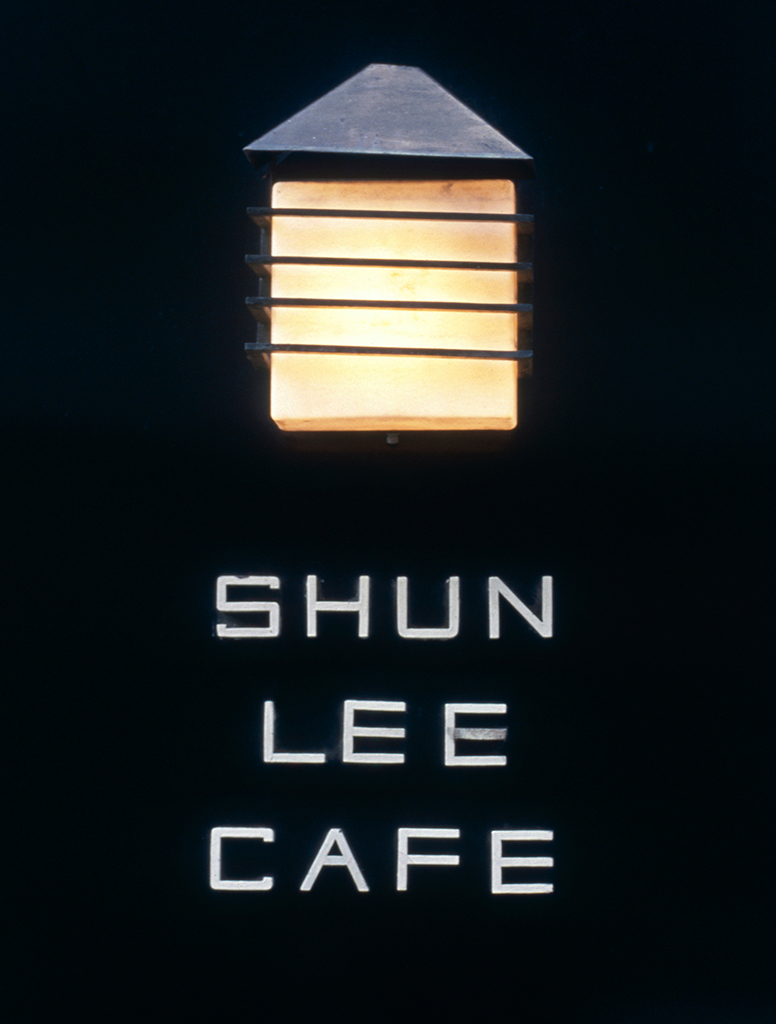
Lantern, Shun Lee Café
4.Telepan
 72 West 69th St at Columbus Ave • 212 285 0222 • $$
72 West 69th St at Columbus Ave • 212 285 0222 • $$ Enjoy market-fresh cuisine, from fresh trout with onion cream to hearty root vegetable soups, by New York chef Bill Telepan at this welcoming restaurant.
5.Mermaid Inn
 568 Amsterdam Ave • 212 285 0222 • $$-$$$
568 Amsterdam Ave • 212 285 0222 • $$-$$$ Everybody’s favorite New England fish shack transplanted to Manhattan is best for simple seafood and fish options. If you are here on a Sunday for “Lobsterpalooza” (a lobster, red bliss potatoes, and grilled corn on the cob), then consider yourself lucky.
6.Boulud Sud
 20 West 64th St • 212 285 0222 • $$
20 West 64th St • 212 285 0222 • $$ Daniel Boulud celebrates flavors of the Mediterranean at this elegant restaurant, with dishes like grilled octopus with Marcona almonds.
7.Rosa Mexicano
 61 Columbus Ave at 62nd St • 212 285 0222 • $$
61 Columbus Ave at 62nd St • 212 285 0222 • $$ This is a branch of one of the city’s most popular Mexican restaurants, famous for its excellent guacamole that is made to order and its power-packed margaritas.
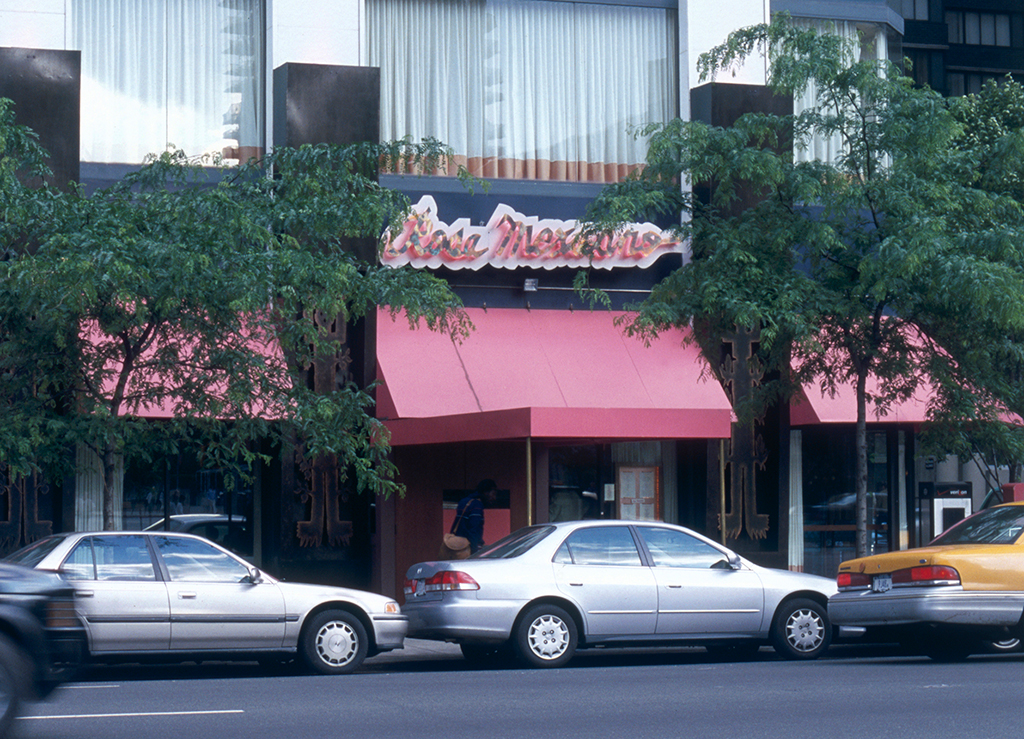
Rosa Mexicano
8.Café Luxembourg
 200 West 70th St at Amsterdam Ave • 212 285 0222 • $$
200 West 70th St at Amsterdam Ave • 212 285 0222 • $$ A classic Parisian bistro with a zinc-topped bar and a hip clientele. The steak-frites can’t be beaten.
9.Calle Ocho
 45 West 81st St at Columbus Ave • 212 285 0222 • $$
45 West 81st St at Columbus Ave • 212 285 0222 • $$ Every night feels like a Latin party; modern dishes are inspired by cuisine from Puerto Rico to Cuba.
10.Gennaro
 665 Amsterdam Ave, between 92nd & 93rd Sts • 212 285 0222 • No credit cards • $$
665 Amsterdam Ave, between 92nd & 93rd Sts • 212 285 0222 • No credit cards • $$ Fans say Gennaro serves the best Italian food in the area, at reasonable prices (explains the constant lines).


